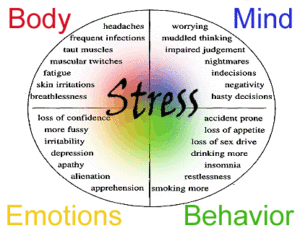Learning how to lower stress can be a very difficult task. Stress can be both mentally and physically draining, so it is important to do what you can to maintain a healthy lifestyle. Here are a few steps you can take to lower your stress levels:
Identify the source of your stress.
Your stress could be caused by lack of sleep, an upcoming exam, unemployment or problems with your relationship. Sometimes your stress can be caused by multiple factors, so it is important to determine what exactly the cause is. If you don’t know what the problem is, how can you fix it?
Create solutions for each source of stress you have identified.
For example, if you are stressed about an upcoming exam, develop a study chart. Break down your studying time into sessions to decrease the likelihood of becoming overworked. Try joining or creating a study group. Be sure not to procrastinate. Leaving everything until the last minute is sure to spike your stress levels.
Add some relaxing activities to your day.
Try joining a yoga class or purchasing a DVD to workout at home. If you find yourself getting overstressed, stop what you’re doing and count to ten, while breathing deeply. Meditating is also a great way to soothe your mind and body. If you’re not the quiet type, even some calm and relaxing music or nature sounds can do wonders. Play this in your car on your way to work. It may help keep you relaxed during rush hour traffic.
Try implementing the above-mentioned tips on how to lower stress. Remember that while some stress is normal, long-term or chronic stress can wear you down and cause serious issues.
According to a WebMD article, there are emotional, physical, cognitive and behavioral symptoms that occur because of stress.
Ongoing, chronic stress can lead to serious health problems, including mental health problems, cardiovascular disease, obesity, menstrual problems, sexual dysfunction, skin and hair problems and gastrointestinal problems.